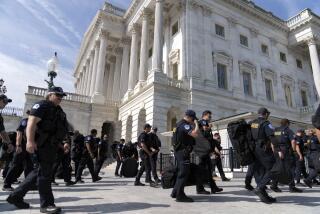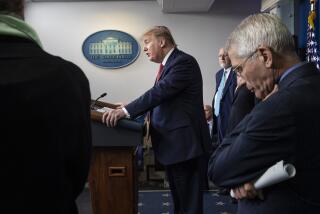Congress Begins Historic Debate on Authorizing War : Gulf crisis: ‘How many young Americans will die?’ Democrat Mitchell asks. ‘Patience at any price is not a policy, it’s a cop-out,’ Republican Michel declares.
WASHINGTON — Congress opened debate Thursday on whether to authorize war with Iraq, and Democrats promptly accused President Bush of recklessly risking American lives by rushing to use force when a solution still can be achieved by peaceful means.
“The grave decision for war is being made prematurely,” said Senate Majority Leader George J. Mitchell (D-Me.) as he began three days of Senate and House debate on the President’s request for authorization to use force if Iraq fails to withdraw from Kuwait by Tuesday.
Democrats argued that it makes no sense for the United States to run the risk of sustaining thousands of battlefield casualties by going to war when the current policy of strict economic sanctions still could force Iraq to back down.
“Prematurely abandoning the sanctions and immediately going to war involves risk,” Mitchell declared. “The risk of human life. How many young Americans will die? That’s the risk--the terrible risk.”
By opposing Bush’s request for authorization to use force, Democrats opened themselves to Republican criticism that they are undermining the President at a crucial moment in history and lending encouragement to Iraqi President Saddam Hussein.
But in speech after speech, Democrats insisted that they do not disagree with Bush’s goal of deterring Iraqi aggression, nor do they rule out the use of force as a last resort.
Sen. Sam Nunn (D-Ga.), chairman of the Senate Armed Services Committee and the Democrats’ leading defense expert, said that his party is just as determined as Bush to achieve an Iraqi withdrawal from Kuwait. Even if the Democrats succeed in depriving Bush of the authorization he seeks, Nunn emphasized, the United States still intends to prevail in the Persian Gulf.
“Either way,” Nunn said, “Saddam Hussein loses.”
Although most of Thursday’s speakers were Democrats, House Minority Leader Robert H. Michel (R-Ill.) spoke up for the President, strongly condemning Democrats for advocating a policy of delay. “Patience at any price is not a policy, it’s a cop-out,” he said.
A keen sense of grave historical importance pervaded the Capitol as members began to consider the first presidential request for explicit congressional authorization to unleash U.S. military forces in more than a quarter of a century.
Even though Bush has never said that he definitely will exercise the power he is seeking, there was a palpable feeling of expectation among members of Congress that war is imminent.
As members rose to express their views, it was clear that they saw it as a key moment in their political careers. “This is the most important vote that Congress will cast in my 23 years here,” said Rep. David R. Obey (D-Wis.).
And while the President is expected to prevail when the House votes Saturday, it was clear that the Democratic Party leadership has decided to take a strong, concerted anti-war stand against Bush. Aligned against the President were the party’s top leaders--including Mitchell and House Speaker Thomas S. Foley (D-Wash.)--as well as virtually every member of Congress who is likely to seek the party nomination for President in 1992.
Democratic opposition to Bush is by no means unanimous, however. Some prominent Democrats such as House Armed Services Committee Chairman Les Aspin (D-Wis.) and House Foreign Affairs Committee Chairman Dante B. Fascell (D-Fla.) strongly support Bush and even helped draft the resolution that would authorize him to use U.S. military force.
The issue of war and peace also was creating odd political alliances and severing old ones. Liberal California Rep. Howard L. Berman (D-Panorama City), for example, announced that he has decided to split with his close political ally, Rep. Henry A. Waxman (D-Los Angeles), on this issue. Berman said that he will vote to authorize the President to go to war against Iraq.
“It was the toughest decision of my life,” he confided. “It feels strange because I’m allied with people with whom I have many disagreements on foreign policy issues.”
Although the Democratic defectors include some of Congress’ strongest pro-Israel members, Berman rejected what he described as an “ugly assumption” by some that he and others were basing their judgment on Israel’s interests rather than America’s.
Mitchell and Foley made a promise to defectors like Berman that they would not pressure Democrats to adopt the party position. And House Majority Leader Richard A. Gephardt (D-Mo.) stressed that the Democratic leadership would close ranks behind Bush if he wins in Congress.
“This decision transcends politics and political posturing,” Gephardt said. “If Saddam Hussein listens to this debate, I hope he will take no comfort in this debate. . . . When we finish, we will be united behind a common goal.”
Nearly all of Congress’ 535 members are expected to speak before the final vote. In California, Sen. Alan Cranston (D-Calif.), who is undergoing treatment for prostate cancer, issued a statement saying, “It breaks my heart that I cannot be present to participate in this stage of the gulf debate in the Senate.”
Perhaps the most stirring antiwar speech was delivered by newly elected Sen. Paul Wellstone (D-Minn.). He began his maiden speech by saying: “I never thought that the first time that I would have an opportunity to speak in this chamber that the topic would be such a grave topic--life and death.”
The resolution proposed by Bush would permit him to go to war any time after next Tuesday without seeking further approval from Congress. An alternative proposal put forth by the Democrats calls on the President to maintain sanctions against Iraq and return to Congress for approval when he has definitely decided to launch an attack.
The President’s supporters argued that passage of the Democratic proposal would send a message to Iraq that Americans do not stand behind the President. Furthermore, they insisted that the United States cannot wait for sanctions to work because the delay would weaken the morale of American troops and the determination of the international coalition aligned against Iraq.
“Stay what course?” asked Michel. “A course that allows Saddam Hussein to know that he is safe from attack. . . ? When patience and delay become foreign policy goals in themselves, as I fear they have for some of our colleagues, they are no longer a virtue.”
But Democrats replied that the United States should not go to war if the coalition of countries opposing Iraq is so fragile that it cannot endure much longer. “If this coalition cannot hold together in peace, what are the chances of it holding together in war?” asked Sen. Joseph R. Biden Jr. (D-Del.).
To many Democrats, Bush’s request for open-ended authorization was reminiscent of President Lyndon Johnson’s 1964 request for congressional approval of the Gulf of Tonkin Resolution, which led to the gradual escalation of U.S. military involvement in Vietnam.
“In its simplest form,” said Mitchell, “the question is whether Congress will give the President an unlimited blank check to initiate war against Iraq at some unspecified time in the future, under circumstances which are not now known and cannot be foreseen, or whether, while not ruling out the use of force, if all other means fail, we will urge continuation of the policy of concerned international economic and diplomatic pressure.”
Like many Democrats, Mitchell cited overwhelming evidence that economic sanctions are slowly draining Iraq of its ability to wage war. They cited CIA figures showing that sanctions have stopped 90% of Iraq’s imports and 97% of its exports.
But Republicans responded with a revised CIA report indicating that sanctions alone would not force Iraq to yield its hold on Kuwait. All members of Congress were invited to study the document before the final vote.
It was the prospect of American casualties of war that Democrats emphasized most in their speeches. Sen. Edward M. Kennedy (D-Mass.) predicted that U.S. forces would sustain about 3,000 casualties a week in a conflict with Iraq, including 700 deaths.
“There are no short and easy wars,” said Rep. David E. Bonior (D-Mich.), himself a Vietnam veteran. “No war is ever really over. Ask the men and women, families and veterans of our last war. Their lives will forever be changed.”
Democrats demanded to know why other nations aligned with the United States are not willing to make a similar commitment of men to the conflict. California Rep. Barbara Boxer (D-Greenbrae) read from a chart showing that the nations most dependent on Persian Gulf oil--including Japan, Spain and Italy--have committed no ground troops.
Boxer and other liberal Democrats in the House also were unusually critical of the citizens of Saudi Arabia and the Kuwaiti royal family for failing to have an army sufficient to oppose Iraq. They frequently portrayed these Arab nations as too rich and lazy to fight.
Another Californian, Rep. George Miller (D-Martinez), remarked that he had just returned from Saudi Arabia, where he saw “young princes still driving around in their BMWs.”
“If there is to be war in the Persian Gulf, it should not be a war in which Americans do the fighting and dying while those who benefit from our effort provide token help and urge us on,” said Mitchell. “If this is an international effort, it should be an international effort in more than name only.”
DEBATE EXCERPTS: A7
More to Read
Get the L.A. Times Politics newsletter
Deeply reported insights into legislation, politics and policy from Sacramento, Washington and beyond. In your inbox three times per week.
You may occasionally receive promotional content from the Los Angeles Times.










